
Kool is an American brand of menthol cigarette, currently owned and manufactured by ITG Brands LLC, a subsidiary of Imperial Tobacco Company. Kool cigarettes sold outside of the United States are manufactured by British American Tobacco.
Virginia Slims is an American brand of cigarettes, currently owned by multinational Altria and manufactured by Philip Morris USA in the U.S. and Philip Morris International outside the U.S.
Capri is an American brand of cigarettes, currently owned and manufactured by the R. J. Reynolds Tobacco Company.
Newport is an American brand of menthol cigarettes, currently owned and manufactured by the R. J. Reynolds Tobacco Company. The brand was originally named for the seaport of Newport, Rhode Island. It is the best-selling brand of menthol cigarettes in the world.
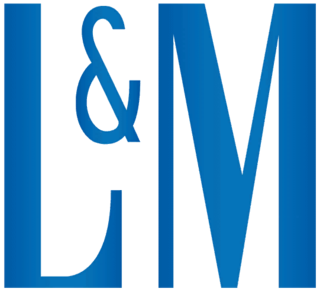
L&M is an American brand of cigarettes, currently owned and manufactured by Altria and Philip Morris International. The name comes from the tobacco company founded in 1873 called Liggett & Myers, predecessor of today's Liggett Group, in which L&M was originally produced.

Nicotine marketing is the marketing of nicotine-containing products or use. Traditionally, the tobacco industry markets cigarette smoking, but it is increasingly marketing other products, such as electronic cigarettes and heated tobacco products. Products are marketed through social media, stealth marketing, mass media, and sponsorship. Expenditures on nicotine marketing are in the tens of billions a year; in the US alone, spending was over US$1 million per hour in 2016; in 2003, per-capita marketing spending was $290 per adult smoker, or $45 per inhabitant. Nicotine marketing is increasingly regulated; some forms of nicotine advertising are banned in many countries. The World Health Organization recommends a complete tobacco advertising ban.
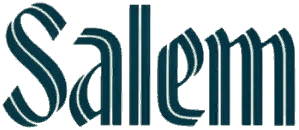
Salem is an American brand of cigarettes, currently owned and manufactured by ITG Brands, a subsidiary of Imperial Tobacco, inside the U.S. and by Japan Tobacco outside the United States.

Eve Cigarettes are an American brand of cigarettes, currently owned and manufactured by the Liggett Group in the United States. Outside of the U.S, Philip Morris International is the manufacturer of the brand.
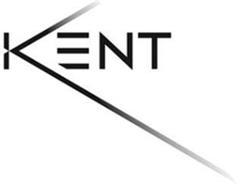
Kent is an American brand of cigarettes, currently owned and manufactured by R.J. Reynolds Tobacco Company in the United States and British American Tobacco elsewhere. The brand is named after Herbert Kent, a former executive at Lorillard Tobacco Company.
Doral is an American brand of cigarettes, currently owned and manufactured by the R.J. Reynolds Tobacco Company.
Winston is an American brand of cigarettes, currently owned and manufactured by ITG Brands, subsidiary of Imperial Tobacco in the United States and by Japan Tobacco outside the U.S. The brand is named after the town where R. J. Reynolds started his business which is Winston-Salem, North Carolina. As of 2017, Winston has the seventh-highest U.S. market share of all cigarette brands, according to the Centers for Disease Control and Prevention and the Maxwell Report.
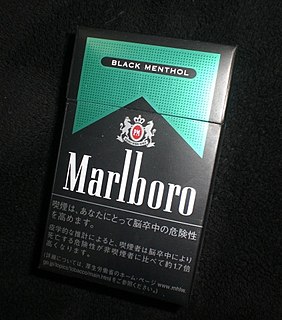
A menthol cigarette is a cigarette flavored with the compound menthol.

Merit is an American brand of cigarettes, currently owned and manufactured by Philip Morris USA in the United States and Philip Morris International outside the United States.
Barclay was an American brand of cigarettes manufactured by R. J. Reynolds Tobacco Company in the U.S. and by British American Tobacco outside of the U.S.
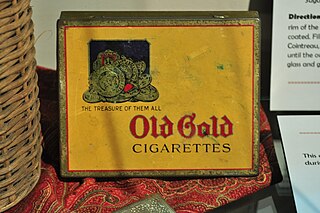
Old Gold is an American brand of cigarette owned and manufactured by the R. J. Reynolds Tobacco Company.

Cigarette smoking for weight loss is a weight control method whereby one consumes tobacco, often in the form of cigarettes, to decrease one's appetite. The practice dates to early knowledge of nicotine as an appetite suppressant.
The tar derby is the period in the 1950s and early 1960s marked by a rapid influx in both cigarette advertising focused on tar content measurements to differentiate cigarettes and brand introduction or repositioning focusing on filter technology. The period ended in 1959 after the Federal Trade Commission (FTC) Chairman and several cigarette company presidents agreed to discontinue usage of tar or nicotine levels in advertisements.
Tobacco marketing targeting African-Americans refers to the practice of customizing tobacco products and advertising techniques specifically to African-American consumers. It is most commonly analyzed through the consumption of mentholated cigarettes, as it represents 47% of black adult smokers and 84% of adolescent black smokers.
Wills Classic is an Indian brand of cigarettes, currently owned and manufactured by ITC Limited. Outside of India, it is manufactured by Imperial Tobacco.

blu is an electronic cigarette brand, produced by Fontem Ventures and owned by Imperial Brands. The brand blu sells various types of rechargeable and disposable e-cigarettes with a wide selection of flavored and unflavored liquids. Its products are available in many countries and each market offers different types of products suited to public demand and opportunities. The global headquarters of blu is located in Amsterdam. Local offices are active around the world to service all markets which sell the brand.












